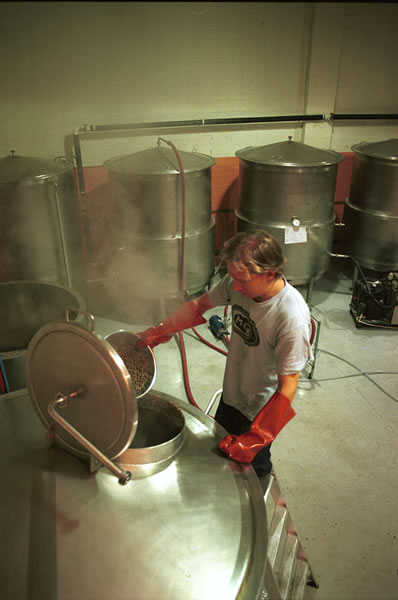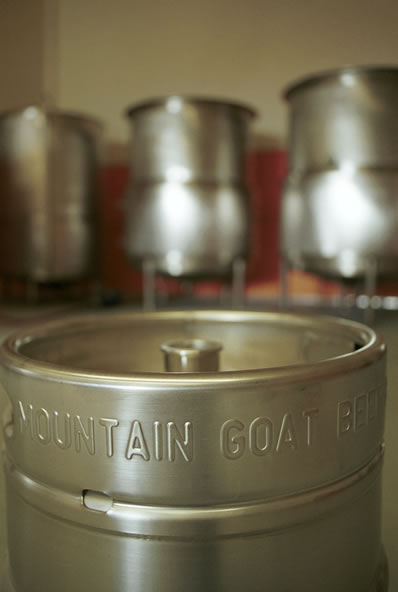
Dave brewing great beer
Q: David, you started off as a home brewer. Tell us, did your home brew really taste as good as your excellent Hightale Ale? If so, why doesn't mine?
A: We had our good beers and our bad believe me. One of the hard things with Homebrewing is temperature control in fermentation and cold storage. Without it you can get some pretty funky fermentation by-products, and some pretty funky beers resulting. Yeast generally has a preferred temperature it likes to ferment, and if you can’t control this, then anything can happen - and often does. But really there a million things to consider when brewing in either way.
Q: Is it a big step to move from brewing 20l of quality beer to 800? Do brewing recipes scale? Any disasters?
It’s very difficult to exactly replicate a beer using the same recipe on two different breweries – this is the challenge of big breweries like Toohey’s who now brew Heineken – they have to get it exactly right every time. And Heineken have to make sure their beer tastes the same no matter where its brewed. When you’re a humble microbrewer its pretty tough. Although the microbrewed version of the Hightail wasn’t exactly the same, we still thought it was great when it was first brewed on a bigger brewery. It was true to the style of beer we were chasing. So, no there were no disasters. We scaled up twice – once from 20 to 800 litres, then from 800 to 1800 litres – the second one was much easier!
Q:What we find most interesting about Mountain Goat is the battler angle - you guys started out in your 20s with nothing and you have build an established brewery based on quality beer with a dedicated (and growing) fan base. And after almost 10 years, you are still here! Australia should be proud of your success. How tough were the early years? Where there times when it all seemed too hard, and you were close to throwing it all in?
A: The early years were tough. I worked part time at another job while Cam hit the pavement and literally knocked on doors to get our initial sales. He got laughed at, yelled at, we had NO money, you name it, but there was enough forward momentum that we never really thought about chucking it in, and really, it was still better than anything else we could think of doing with our lives. We believed in the plan – which was, and still is, to grow slowly and build solid foundations – we always wanted to be here for the long haul. In some ways we feel every bit of the 10 years, but in other ways its gone by so fast...
Q:
How did you feel when your first batch went off commercially? Was
it a keg? We understand that at least some early deliveries ended
up in the Great Britain Hotel - did you sit around the bar waiting
for someone to buy your beer to see their reaction?
A: That’s exactly what happened only it was Cam and I that bought most of our early batches. When we got on tap at a new pub that we made sure they ran out regularly – and it was mostly us and our good friends who made that happen. When someone bought our beer and we didn’t know them it was quite a buzz. I still get stoked seeing someone I don’t know drinking our beer, or wearing our T-shirt – it’s very gratifying.
Q: Does the brewery pay its way now?
A: Well, we haven’t bought a boat lately, put it that way. But we are paying ourselves and four others a wage now so yes, its paying its way.
Q: You seem to be focusing on the Melbourne market - that is, close to the brewery, which is the way things were up until 100 years ago or so. Is this a deliberate strategy? Any chance of seeing Hightale Ale at least available nationally down the track? Do you promote your beer as 'Melbourne' beer as such?
A: Its very much a deliberate strategy. Beer is best drunk fresh – the closer the brewery is to where you’re drinking it the better chance it has of being in peak condition. We estimate that 70% of our beer is drunk within about 20 klms of the brewery. As long as we can sell beer that close to home and keep growing that will remain our focus. Melbourne’s a great city for food and wine, and there are so many great pubs and bars that its an ideal place for us in that regard as well.
We’ll get to as many other cities as we can, we do have limited distribution in Sydney, Canberra, Adelaide, Brisbane and Launceston, but Melbourne will always be our focus.
Q: Was there a lot of red tape involved in starting a brewery? What could the government do to make life easier in terms of setting up and running small breweries such as yourselves? We understand that the US and UK governments offer various concessions for example.
A: The biggest thing the federal government could do right now is give us an excise rebate on the amount of excise tax we pay. We currently pay the same effective rate of tax as the big breweries. Its like earning an apprentice wage and being taxed at the top bracket. Many countries including the US, Ireland, Canada and many European countries offer lower excise payments based on the size of the brewery to help establish the industry – and lo and behold – these countries have excellent beer, and many healthy, viable breweries. We are currently attempting to persuade our government that this can be a good thing for all Australians, not just us brewers!
Q: Have you found it difficult to get into pubs, or are many tied one way or the other to one of the big boys and are hence not interested?
A: Its not easy, but as more and more of us appreciate different beer, we’re demanding it at the tap as well as the bottle shop. It’s becoming a point of difference for many pubs, and therefore publicans become more open to putting something different on. It was harder when we first started - but they still don’t just walk in the door...
Q: Do you sell more beer in kegs (ie on tap) or in bottles?
A: We’re about 50/50 at the moment – which suits us pretty well.
Q: How has the market reacted to your newer beers, such as the Pale Ale, the IPA and the Stout. These beers are at least in our experience harder to find outside of Melbourne. We understand that the Stout and the IPA are seasonal - is that because people really do drink more dark beers in winter? Do you have any other beers planned?
A: The Hightail is definitely our flagship beer and our biggest seller – it’s really the only one that we put into kegs apart from special one-off here and there (all our beers are on tap in the brewery bar though).
But having said that there’s strong support for all the others. The IPA has been a bit of a runaway that began life a seasonal but we now brew it year round – its the ‘Brewer’s Choice’ around here at the moment. It was also Australia’s first certified organic beer. The Stout did really well at the 2006 Australian International Beer Awards winning Champion Stout and the Premier’s Award for Victoria’s best beer. And the Pale Ale ticks over doing its thing...
Q: Finally, what's in store for the Goat over the next couple of years?
More beer, different beers, going Solar - we’re putting solar panels on the roof here – we’re trying to go the next step on from Organic Beer – a Solar Powered, Rain Water Beer...Breweries can be pretty environmentally aggressive, so we’re trying to lighten our ‘Carbon Footprint.’ But its early days just now on that front.
AustralianBeers.com thanks Dave for taking the time to give us some insight into the Goat. And make an effort to try a few Goat beers - they're excellent.

The keg
to look for